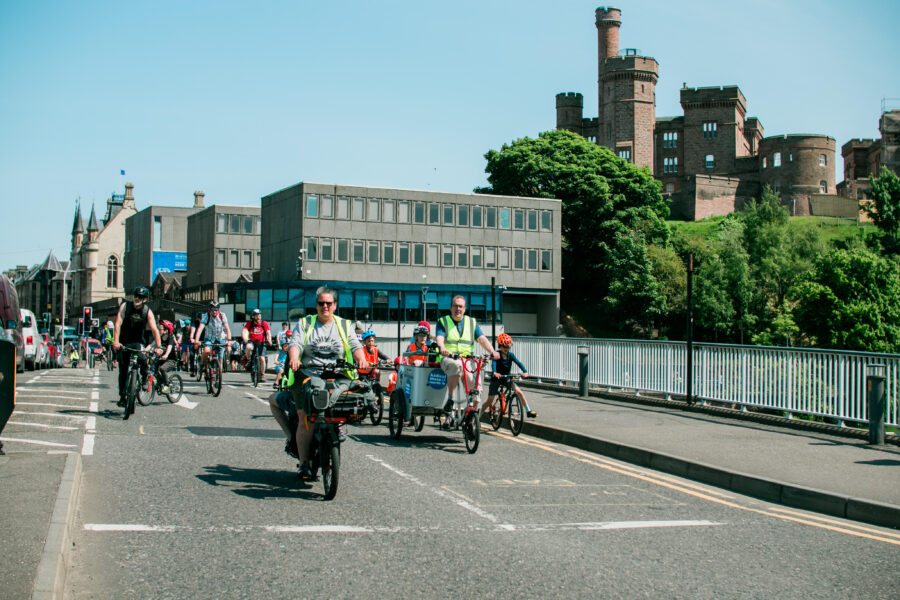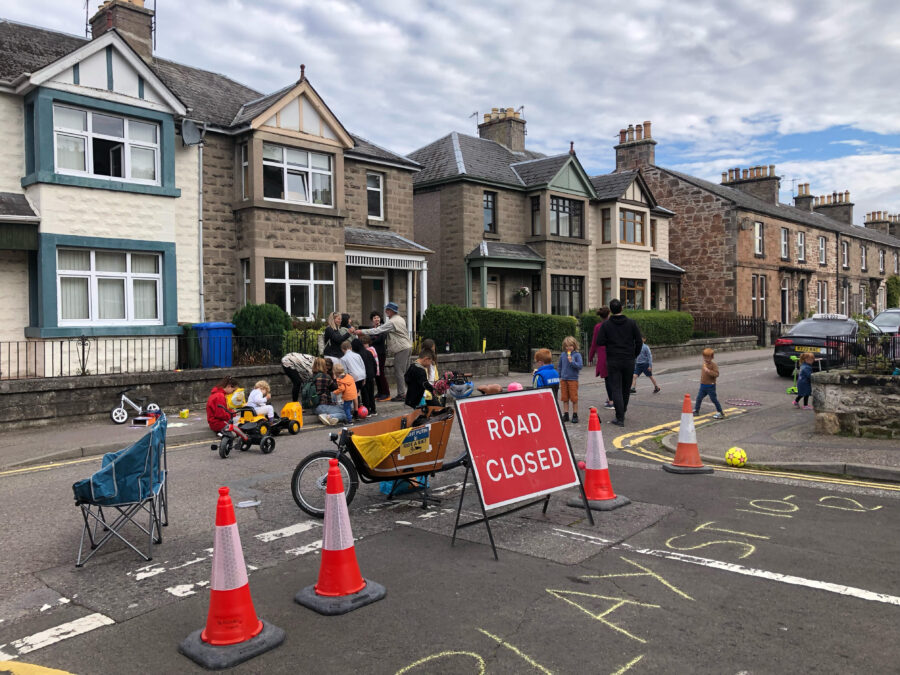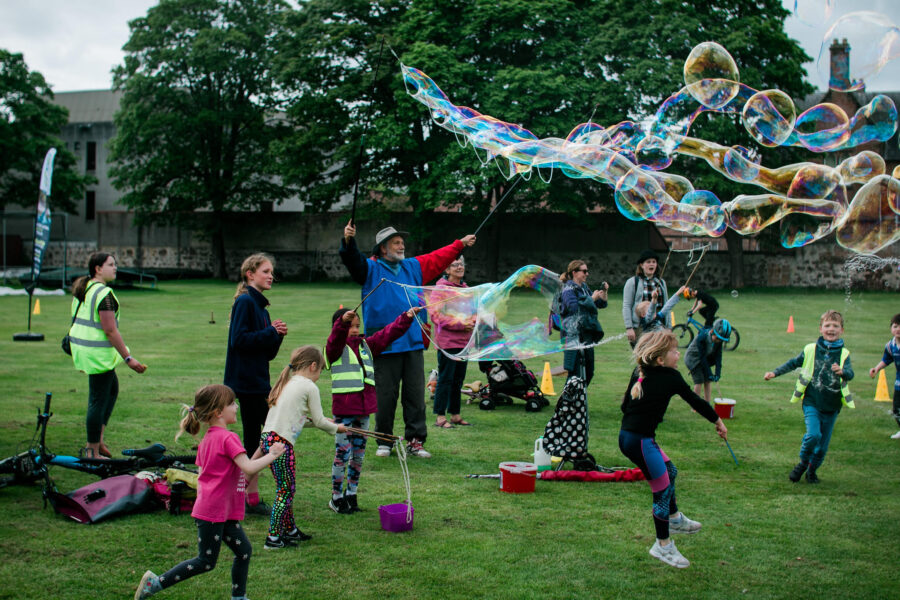Emily Williams has lived in Inverness for 20 years, and recently took the role of Bicycle Mayor. For the last year and a half she has been the CEO of a social enterprise called Velocity Café and Bicycle Workshop, a community space and outreach projects engaging different groups of people in increasing their levels of physical activity or taking up cycling to live a more healthy and sustainable life. This conversation focuses on knowledge exchange and collaboration in the Bicycle Mayor Network.
–
Please could you speak on your path to cycling advocacy?
It definitely started as a sport for me. My husband bought me a mountain bike when we graduated from university, and we engaged in various sporty cycling activities for quite a while. I always cycled around town because it was rather easy. Then, I had a baby who is now 14, and I suppose that’s when my passion for cycle campaigning started, especially when we were trying to teach him to cycle. He didn’t want to be on the tag-along in the back of our bike; he wanted to cycle by himself. However, you perceive roads in a completely different and terrifying light when you have a five-year-old on a bike.
With this new lens on road safety, I trained and volunteered to deliver Bikeability, the national cycle skills program in the UK. I did that at school for a couple of years, and that was truly my first interaction with Velocity Café. Through them, I acquired cycle trainer qualifications, and we had numerous plans to revolutionise everything in the city. However, with the onset of Covid, we weren’t allowed to do anything. I was at that point that I became particularly interested in Urban Design, recognising how unfit for purpose the roads are for cycling here in Inverness.
It really began with the entrance to my son’s school, which is unbelievably difficult to navigate on a bike. You go through a busy five-way signalised junction and then have to make a right turn across traffic, just 50 metres from the traffic light, often dealing with queuing cars. This leads to the school car park entrance since there isn’t a direct entrance to the playground for children on bikes. The whole setup is absurd. That’s when I first attempted to initiate change, but my efforts as an individual didn’t yield results. However, through this, I started making contacts with others who were campaigning in slightly different areas in Inverness. So when the council removed the space for people Covid measures that we liked but had taken for granted and not spoken up in favour of, we spontaneously organised the first kidical mass. To our surprise, 60 people turned up. Encouraged by this, we held another one, and by the third event, we had 250 riders, which was incredible. It brought the entire city centre to a standstill as the massive influx of cyclists backed up the streets. It was an amazing sight.
Having worked as a civil engineer for 20 years, within the kidical mass organising, my focus shifted towards engaging with the council and speaking with counsellors, rather than the nitty-gritty of organising daily rides. Eventually Saskia from Bath suggested that one of us should become a Bicycle Mayor, everyone encouraged me to take on the role.
So, that’s my gradual descent into becoming a Bicycle Mayor.

Image: Emilly leading Kidical Mass
Your approach combines official training, and community zeal, how does that lead you to interact with, and maybe even capacitate, the council?
When considering my goals as a Bicycle Mayor, it struck me that Inverness only has about 20 metres of segregated cycle lanes in the town. To be fair to the council, there’s a lot of planning, strategy, and consultation currently underway. Apparently, they are starting to build the first scheme we campaigned for this week. I believe the cycling community here, which is highly active and robust, attracts people to Inverness because of their love for the outdoors and an active lifestyle. My aim was to amplify that voice and make it public, creating a central positive advocacy for cycling.
There are lots of people who have said ‘You’re going to engage with the business community and change their minds’ but I would respond with that there’s not enough energy for that. I’m never going to change the mind of a politician who doesn’t think cycling infrastructure is a good idea, but what I can do is give all the councillors who do support it a good reason to continue doing so. As they are democratically elected and supposed to reflect the opinions of their constituents, if it comes to a vote on a scheme and all they have in their inbox is people saying, ‘This is rubbish. I don’t want it,’ it’s quite challenging for them to vote for it, even if they think it’s the right thing. So, within our WhatsApp group, we can easily generate emails to the council at a rate of about three to one in favour of the scheme
How does your position as Bicycle Mayor impact your ability to coach the city?
I’ve spent a lot of time getting to know the local councillors here, and the title of Bicycle Mayor has proven to be immeasurably useful. While I’m not doing anything different from what I was already doing, having this title means that among the 24 councillors on the Inverness committee, there are probably eight to ten whom I could email with a question and be confident of receiving a reply. This is because they know me, and we’ve had repeated conversations. They are inclined to support initiatives that I’m advocating for.
Developing relationships with reporters in the local papers has also been incredibly useful. Before delving into this, I don’t think I fully appreciated the influence local papers hold. Now, I aim to get at least two cycling-positive stories in the local papers every month. The reporters often reach out to me as soon as anything related to cycling is published, seeking my perspective on the matter.
You mentioned the local connections you have as a Bicycle Mayor, how have your ideas grown thanks to global connection with the full Bicycle Mayor Network?
The most significant aspect for me is being part of that community; there’s something genuinely supportive about it. On the days when it feels like you’re banging your head against a brick wall and nothing is happening, and it seems like everything is pointless and won’t change, you can hop on a call. There, you engage in some chit-chat, and we’ve had great discussions at the start of calls where we all share something like the book we’ve just read (really interesting ones all round!). It’s that sense of knowing that you’re not alone in this struggle. It’s not just your town that’s resistant to drastically needed change; it’s a global phenomenon that people are generally hesitant to change, despite all the evidence suggesting it’s a good idea.
I particularly remember talking to the Bicycle Mayor of Amsterdam. In the UK, we often view Amsterdam as this utopia that is entirely cycle-friendly and has everything sorted. However, it turns out that even in a cycling paradise, there’s still a need for the Bicycle Mayor to advocate for various matters. I guess it’s just a constantly evolving situation where there’s always room for improvements, and we can continue to make cycling more accessible. It’s crucial to recognise that we are still at the beginning stages of behaviour change towards cycling, and some places are just a little further along the journey.

Image: Road Closed for Play Streets
As a Bicycle Mayor, what would be your dream collaboration?
As a Bicycle Mayor, my dream is to see at least 10 Bicycle Mayors in Scotland, with representation in major towns, cities, and ideally, some in rural areas; and for all of these figures and positions to be officially recognised by the government. In this scenario advocacy would be supported at a government level, acknowledging the challenges faced by grassroots campaigners against well-funded organisations opposing change and campaigning against it. Examples of these on a national level are powerful entities like oil and big car companies, while locally, organisations like our “business improvement district” oppose cycling measures for town centre improvement, believing it could be detrimental to business.
While the Scottish government has set active travel infrastructure targets and provided substantial funding, without grassroots campaigns, the more ambitious schemes face opposition from people resistant to change, often due to convenience of driving. So I believe there should be national support for individuals advocating for these changes on the ground.
It’s disheartening that it takes a group of concerned mothers to organise a monthly protest and invest significant personal time in encouraging people to engage in consultations. There’s a great silent majority in the middle who may not be fully aware of upcoming schemes or might not care strongly one way or the other. This is understandable as while some may vaguely support cycling and road safety change, due to busy schedules and a lack of passion they are unlikely to actively participate.
Making the voice of this majority heard is crucial for truly representative community feedback. Those who strongly oppose a project are typically more vocal, making consultations somewhat self-selecting. My focus is on encouraging those who wouldn’t normally speak up to participate, similar to how opponents already do. However, it feels like I’m up against much larger organisations in this fight.
I was reading something that the Edinburgh Council had done recently. They conducted a consultation but also commissioned representative polling in the area where they were considering implementing a new transport scheme. The representative polling revealed a significantly different demographic spread compared to the consultation. Consultations, being self-selecting, tend to overrepresent the 45 to 65 age range. The different answers from the representative polling highlighted the importance of tapping into diverse demographics.
The issue is the tendency to treat a consultation as a mini-referendum, but it shouldn’t be. Working within the system requires someone to advocate for a positive voice, even though it might be tempting to upend the system entirely.
Is there a last message you’d like to finish on in regards to the role of the Bicycle Mayor Network in your plans for collaboration and mutual teaching, both locally and globally?
The universality of the Bicycle Mayor network makes the challenges we face in Inverness and cycle advocacy, in general, feel less demoralising. Getting into cycle advocacy is often driven by the desire to combat climate despair, and it’s true that taking local action and contributing does make a difference. However, it’s important to acknowledge that the work can be extremely challenging and, at times, overwhelming. Working together is the way to overcome this feeling, and our challenges.

Photo by Katie Noble

